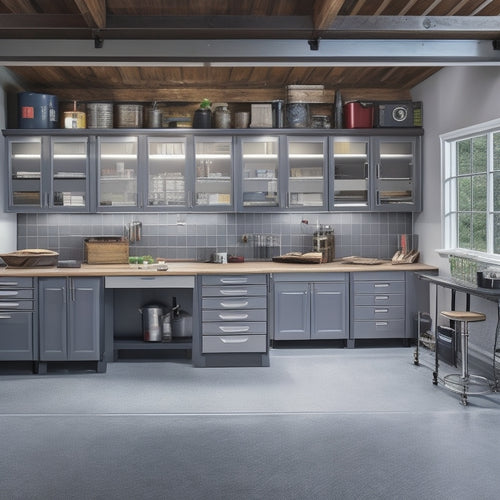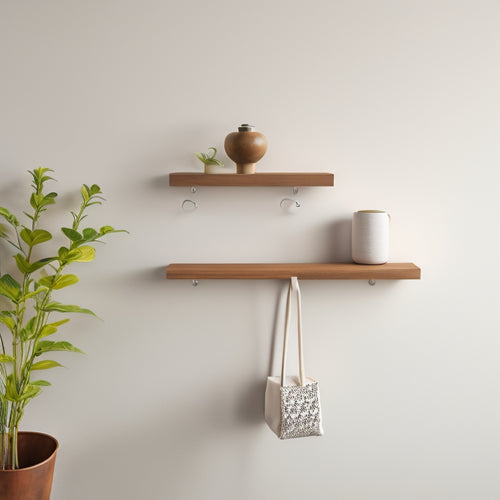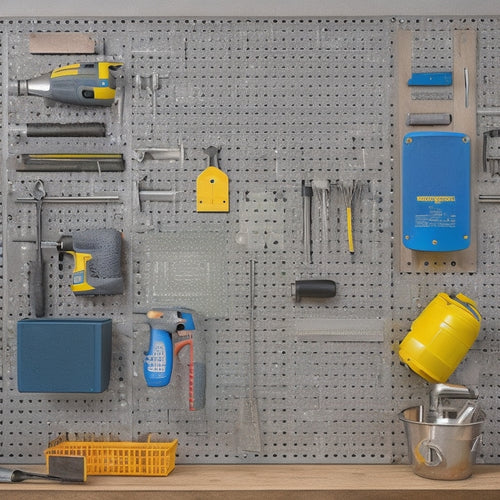
Therapists' Toolbox: Creative Occupational Therapy Activities Unveiled
Share
As occupational therapists, we understand that a well-stocked toolbox is essential to unleashing our clients' full potential. We fill our supply closets with creative, innovative, and budget-friendly activities that ignite imagination, foster development, and make therapy a joyful experience. From sensory play to fine motor skills, we engage children's curiosity with craft projects, DIY alternatives, and essentials like playdough and fidget toys. By integrating humor and self-care, we cultivate a positive atmosphere that empowers clients to succeed. With our therapist's bag of tricks and tools, we're prepared to support skill development through creative play - and that's just the beginning of what we have in store.
Key Takeaways
• Stock a therapy supply closet with creative tools and toys, including clearance sale finds, repurposed items, and DIY sensory bins.
• Use playful learning activities to build skills, engaging clients in hands-on experiences that promote development and empowerment.
• Incorporate humor and self-care into occupational therapy, fostering a positive atmosphere and using laughter as a stress relief tool.
• Develop fine motor skills and beyond through activities that stimulate senses, enhance motor control, and promote problem-solving abilities.
• Curate a therapist's toolkit with innovative interventions, essentials, and creative tools to meet clients' unique needs and support skill development.
Stocking the Therapy Supply Closet
We scour clearance sales and repurpose everyday items to stock our therapy supply closets with a variety of tools and toys that can be adapted to meet the unique needs of our clients.
When it comes to organization tips, we swear by categorizing our supplies by theme, like sensory or fine motor, and storing them in labeled bins.
Budget-friendly finds like rice, beans, and sand are staples in our closets, and we love DIY alternatives like turning old containers into sensory bins.
Our therapy supply must-haves include playdough, puzzles, and fidget toys, which can be easily adapted to suit individual client needs.
Sensory Play and Developmental Skills
Crafting sensory experiences through play helps occupational therapists pinpoint areas where children may need extra support, while also fostering developmental skills like fine motor control and hand-eye coordination. As we design these experiences, we're not just having fun - we're intentionally targeting specific skills.
Through sensory exploration, we can identify potential delays in motor development, and then create playful interventions to address them. By incorporating sensory-rich activities into our sessions, we can help children refine their skills in a way that feels engaging and enjoyable.
Creative Craft Projects and Activities
Through creative craft projects and activities, occupational therapists can tap into children's natural curiosity, encouraging them to explore, experiment, and express themselves while developing their fine motor skills, hand-eye coordination, and cognitive abilities.
We love incorporating sensory exploration and art therapy into our sessions, allowing kids to engage their senses and convey emotions through creative expression.
By making our own DIY sensory tools and therapeutic crafts, we can tailor activities to each child's unique needs and interests. From finger painting to collages, these projects foster imagination, creativity, and self-confidence.
As occupational therapists, we're passionate about using creative craft projects to help children grow, learn, and thrive.
Fine Motor Skills and Beyond
In occupational therapy sessions, we zero in on fine motor skills, recognizing that dexterous hands and fingers are essential for a wide range of daily activities, from zipping jackets to typing on keyboards.
We take it a step further by incorporating sensory exploration to stimulate the senses and enhance motor control. Through activities like playdough manipulation and finger painting, we challenge our clients' fine motor skills while engaging their senses.
Additionally, we incorporate cognitive challenges to improve problem-solving skills, hand-eye coordination, and dexterity. By combining fine motor skills with sensory exploration and cognitive challenges, we empower our clients to develop the skills they need to succeed in everyday life.
Playful Learning and Skill-Building
We often find that the most effective way to build skills in occupational therapy is by incorporating playful learning activities that disguise challenges as fun, interactive experiences.
Through sensory exploration, we engage our clients in hands-on activities that stimulate their senses and promote development.
Interactive games, such as puzzles and obstacle courses, challenge our clients to think creatively and build problem-solving skills.
By making therapy a game, we empower our clients to take control of their learning and develop essential skills in a fun and engaging way.
Therapist's Bag of Tricks and Tools
Our therapy supply closets are stocked with an array of creative tools and toys that help us design engaging and effective occupational therapy activities. We're always on the lookout for innovative interventions to add to our therapy toolkits.
From sensory toys to craft supplies, our therapist essentials are carefully curated to meet the unique needs of our clients. We repurpose items found in clearance sales and household items to prevent burnout and introduce new interventions.
Our practical resources are designed to support cognitive, emotional, and motor skill development through creative play. By staying organized and resourceful, we can provide our clients with the best possible therapy experiences.
Humor and Self-Care in OT
As occupational therapists, we've learned that injecting humor into our daily routines not only helps us cope with the demands of our profession but also fosters a more positive and playful atmosphere for our clients. Laughter therapy is a powerful tool for stress relief, and we've found that it can be as simple as sharing a funny meme or joke with our colleagues.
Frequently Asked Questions
How Do Occupational Therapists Measure Progress in Pediatric Therapy Sessions?
Coincidentally, we just celebrated a breakthrough with a young client, and it's amazing how far they've come! We measure progress in pediatric therapy sessions by setting achievable goals, tracking progress, and adapting strategies to meet each child's unique needs.
What Are Common Obstacles in Implementing Sensory Activities in Schools?
We occupational therapists face common obstacles in implementing sensory activities in schools, including time constraints that limit session duration and budget limitations that restrict access to necessary materials and resources.
Can Occupational Therapy Be Used to Treat Emotional Regulation Disorders?
Like a master chef seasoning a dish, we occupational therapists skillfully blend emotion coaching and mindfulness exercises to help clients regulate their emotions, empowering them to take control of their emotional well-being.
How Do Therapists Adapt Activities for Children With Multiple Disabilities?
We adapt activities for children with multiple disabilities by incorporating inclusive play and accessible materials, ensuring every child can participate and thrive, regardless of their abilities.
Are There Any Occupational Therapy Certifications Beyond the Otr/L?
We explore certification paths beyond OTR/L, seeking specialized training to enhance our skills, like the Certified Hand Therapist or Certified Driver Rehabilitation Specialist, to better serve our clients with diverse needs.
Related Posts
-

Best Tool Chests for Home Garage Options
When selecting the best tool chest for your home garage, you'll want to evaluate top brands like DeWalt, Milwaukee, a...
-

Wall Mounted Hooks With Shelf for Maximum Storage
You'll find that wall mounted hooks with a shelf are a revolutionary solution for maximizing storage in your home, pr...
-

How to Hang a Pegboard in 5 Easy Steps
You'll hang a pegboard in 5 easy steps by first preparing the wall, ensuring it's sturdy and free of obstructions. Ne...


